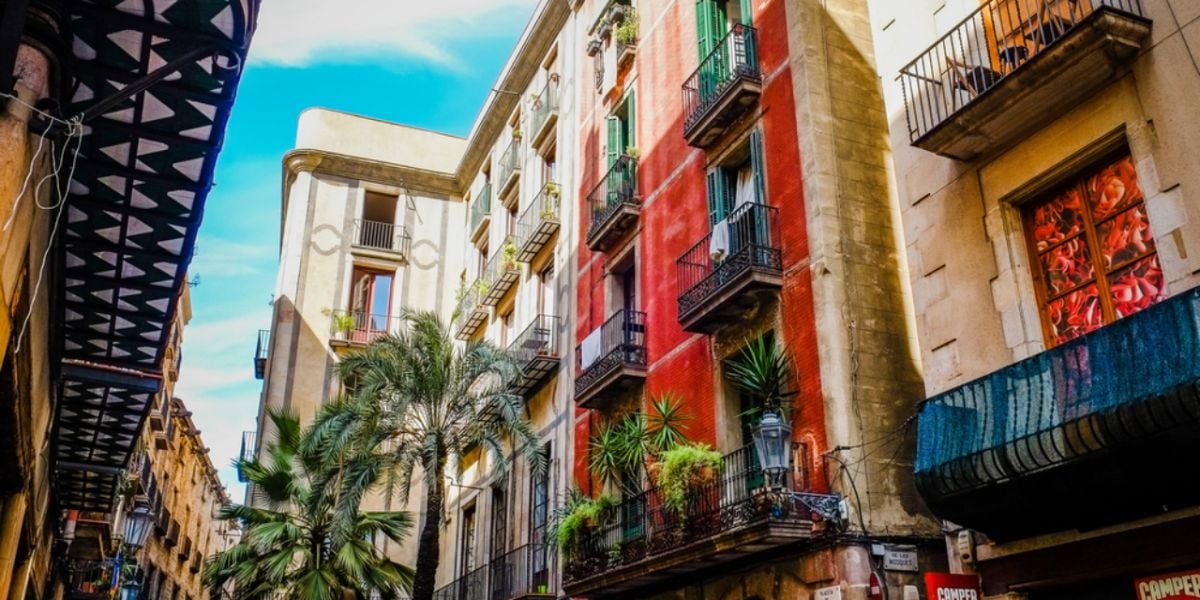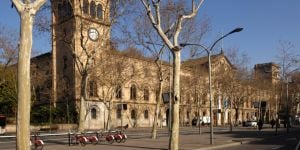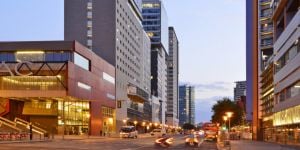
Barcelona sits on the coast of north-eastern Spain, the capital and largest city in the autonomous community of Catalonia. It is a friendly, cosmopolitan place with a mix of Spanish and foreign nationals from all over the world. Many expats come here for a better life and to enjoy a city with an easy-going lifestyle, incredible scenery and rich cultural heritage. When they arrive, they discover an extensive choice of properties spread across the city's ten districts.
Barcelona is a Mediterranean port and a major cultural, economic, and financial center with a population of of 1.686.208 as of 2024. It is the second-largest city in the country and one of Spain's leading tourist destinations.
Best reasons to live in Barcelona
From the weather, architecture and food to excellent public transport, sporting activities and beaches, many reasons make Barcelona an amazing place to live. Here are a few of them:
The excellent climate: The Catalan capital is known for its gorgeous weather with a good year-round climate. The winters are short and rarely freezing, and the summers are hot.
Lots of activities: Whether you want to watch a film, play or concert, head to the beach, see the sights, or party until dawn, there's a seemingly endless number of ways to fill your free time.
Gastronomy: From produce markets boasting fresh seafood to casual and fine-dining restaurants, Barcelona is a paradise for foodies. And if you're looking for an affordable night out, many restaurants offer three-course meals for around 12 to 15 euros.
The beaches: The city boasts numerous beaches, all of which are easily accessible. And thanks to the favorable climate, they can be enjoyed during most months of the year.
Cultural activities: You can wander the exhibition halls of a variety of world-class museums, such as the Catalan National Art Museum, the Maritime Museum, the Museum of the History of Catalonia and the Picasso Museum.
The parks: Barcelona has many parks and gardens dotted all over the city. And according to the city council, than 1.5 million trees in the city's streets, parks and avenues.
Public transportation: You can easily get around the city using the efficient and economical public transportation system that comprises train, tram, bus and metro.
Quality of life: The city is consistently ranked among the best cities globally for quality of life, safety and equality.
Health and medical services: Barcelona boasts world-class public and private medical services.
A smart city: Barcelona is known as a smart city, with continuing investment in information and communication technologies to operate more efficiently. This includes 1) the deployment of sensors to monitor noise levels, temperature, humidity and air pollution in real time, 2) smart waste management and smart traffic management systems 3) Citizen participation platforms like Decidim Barcelona where anyone can make suggestions and vote on projects to improve life in the city.
Barcelona's districts and neighborhoods
Barcelona is divided into ten districts which are further divided into a multitude of neighborhoods. To help familiarise you with the city, here is a brief look at each district. Every area boasts its distinct vibe, personality and allure. Among the most popular areas for expats to live are the old town, Gràcia and L´Eixample.
Barcelona Old Town
Barcelona's old town is one of the city's most atmospheric and charismatic parts, with its ancient buildings and network of winding streets and squares. It is divided into four neighborhoods: the Gothic Quarter (the oldest part of Barcelona and the place where it was founded), Sant Pere, Santa Caterina i La Ribera, The Raval and Barceloneta. The old town is a constant bustle of activity with crowds of tourists and residents, so if you like to be in the middle of the action, then this neighborhood is for you. The main attractions include the Barcelona Cathedral and the Museum of Contemporary Art.
The average price per month for rented accommodation in the old town is around 26 euros per square meter.
L'Eixample
This quiet, residential and affluent district encompasses some of the city's most iconic buildings, important avenues and boulevards. The area was built in the late 19th century and is divided into six neighborhoods, including Dreta de l'Eixample, a commercial neighborhood, the Sagrada Família neighborhood and Fort Pienc, with its many green spaces. The main attractions include Sagrada Família, La Pedrera and Casa Batlló.
The average price per month for rented accommodation in L'Eixample is around 28 euros per square meter.
Gràcia
A bohemian, cosmopolitan and lively district spread across the foothills of the Collserola mountain range. It is home to lifelong residents, students, artists and gypsies and has a relaxed, village-like feel. Creativity bursts from just about every quarter, from small, independent stores and boutiques to studios and cultural centers. Gràcia district becomes a hub of the city's nightlife when the sun goes down. The main attractions include Park Güell and Plaça de la Virreina.
The average price per month for rented accommodation in Gràcia is around 27.5 euros per square meter.
Horta Guinardó
Lying at the foot of the Collserola range, the Horta-Guinardó district gives residents and visitors exceptional views of the rest of Barcelona. The city's third-largest district comprises 12 neighborhoods and has more than 1,000 years of history. Hints of the ancient past can be experienced in the Sant Genís dels Agudells neighborhood, which formed around its 10th-century Romanesque church. The main attractions include green spaces such as Les Aigües Park and Príncep de Girona Gardens and the former Hospital de Sant Pau i la Santa Creu, a UNESCO World Heritage site.
The average price per month for rented accommodation in Horta Guinardó is around 21.5 euros per square meter.
Les Corts
One of Barcelona´s wealthiest districts comprises three neighborhoods: Les Corts, Pedralbes and La Maternitat i Sant Ramon, home to FC Barcelona´s Nou Stadium. Among the biggest draws of the district are its parks and gardens, echoes of the area´s rural past. Today this is a predominantly residential district with a good smattering of bars and restaurants. The main attractions, in addition to the stadium, include Parc de Can Rigal and the gardens of Palau de Pedralbes and Parc de Cervantes.
The average price per month for rented accommodation in Les Corts is around 24 euros per square meter.
Nou Barris
Nou Barris is located in the city's far north, adjacent to Sant Andreu and Horta-Guinardó. Away from the hustle and bustle of the city center, it is a relatively quiet place with steep, irregular streets and many green areas. Its gorgeous parks include Parc de la Guineueta, Parc del Turó de la Peira and Parc Central de Nou Barri. Other popular attractions include Via Julia, a vital shopping hub and Plaça de la Republica (previously known as Plaça Llucmajor).
The average price per month for rented accommodation in Nou Barris is around 21.5 euros per square meter.
Sant Andreu
With its porticoed squares and old cobbled streets, Sant Andreu has a vintage charm and village feel, a cozy, comfortable place with a laid-back vibe. The district´s industrial past is glimpsed in its old factories and industrial complexes that have been turned into parks, arts centers and amenities. They are enjoyed by tourists and locals that consist of lifelong residents, young artisans and families. The main attractions include La Pegaso (a former lorry factory now a park with a water canal flowing through it), the neoclassical church of Sant Andreu del Palomar, and the food market in the Plaça Mercadal.
The average price per month for rented accommodation in Sant Andreu is around 12 euros per square.
Sants-Montjuïc
Barcelona´s largest district lies beneath the imposing Montjuïc, a prominent hill. It comprises eight neighborhoods extending to the mound's foot, into the countryside and down towards the sea. There are plenty of outdoor spaces to enjoy glorious sea views and mountain walks, as well as many cultural and sports facilities, lively squares, bars and restaurants. The main attractions include the theatres, bars and discos on the Avinguda del Paral-lel and the Parc de Montjuï.
The average price per month for rented accommodation in Sants-Montjuïc is around 23.5 euros per square meter.
Sant Martí
Sant Marti is a district with beaches and long stretches of sand gently sloping into the Mediterranean. It sits on the city's eastern side and comprises several neighborhoods, such as El Poblenou, La Verneda i la Pau and El Camp de lŽÁrpa del Clot. The old factories and their chimneys that once dotted the district's skyline have now given way to modernity as technology companies have moved in, transforming Sant Marti into Barcelona´s Silicon Valley.
The main attractions, in addition to the seaside, include Sant Martí Church, Sant Marti de la Verneda Park and the Glories shopping mall.
The average price per month for rented accommodation in Sant Marti is around 25 euros per square meter.
Sarrià-Sant Gervasi
This is one of Barcelona's greenest districts, an inviting place of quiet charm. There are six neighborhoods, which are noted for their attractive homes, narrow streets and little plazas. One of the district's biggest calling cards is that it's a gateway to Collserola Natural Park, an 11,000-hectare green expanse popular with walkers, cyclists and nature lovers. Other popular attractions in the district are the Science Museum and Tibidabo Amusement Park.
The average price per month for rented accommodation in Sarrià-Sant Gervasi is around 27 euros per square meter.
Cost to rent or buy in Barcelona
Barcelona is a vibrant city with a bustling real estate market. However, as with any popular destinations, prices for both rentals and purchases can be steep. So here are a few pointers on what you can expect to pay.
Barcelona's rental prices for a one-bedroom property in the city center are between 1,000 and 1,685 euros per month (the average price is 1,300.06 euros). Outside the city center, you can expect to pay approximately 850 to 1,225 euros per month (the average price is 988.62 euros). A three-bedroom apartment can cost between 1,500 and 3,300 euros per month in the center (the average price is 2,188.09 euros) and between 1,150 and 2,200 euros outside the center (average price is 1,491.50 euros).
To purchase a property in Barcelona, the price per square meter for a city center apartment is from 4,561 euros to 7,000 euros (the average price is 5,562.42 euros). The average price per square meter for an apartment outside the center is from 2,800 euros to 5,000 euros (the average price is 3,864.11 euros).
How to find cheap rentals in Barcelona
Finding an affordable place may seem daunting, but numerous rental options are available to suit different budgets. Here are a few useful tips to help you find cheap accommodation in Barcelona:
- Use websites like Idealista, Fotocasa and Habitaclia to search for rental properties.
- Consider sharing accommodation with roommates or renting a room to reduce your rental expenses.
- Don't hesitate to negotiate rent, especially if renting from an individual rather than a rental agency.
- Join Facebook groups or use X (formerlyTwitter) and Instagram to find cheap accommodation in the city.
- Attending viewings can help you negotiate a good deal with the owner.
- Flexibility with your move-in date or the accommodation type you're looking for can help you find cheaper options.
Rental agreements in Barcelona
The rental agreement outlines the terms and conditions of the tenancy, including the duration of the lease, the monthly rent payment and the responsibilities of both the tenant and landlord.
In Barcelona, the standard long-term rental contract is for five years. Tenants are typically required to pay a deposit of one to two months' rent upfront, which is returned at the end of the lease if the property is returned in good condition.
Monthly rent payments in Barcelona are usually made by bank transfer, and tenants are responsible for paying all utility bills, such as electricity, gas and water. Landlords are responsible for maintaining the property and ensuring it is habitable, while tenants are expected to keep it clean and report any maintenance issues to the landlord.
Be sure to read and understand the rental agreement before signing it to avoid any misunderstandings or disputes down the line.
House hunting tips for Barcelona
If you are going to buy your own place in Barcelona, these helpful tips will steer you in the right direction.
To find your home, look for online accommodation offers and classified ads in local newspapers. If you are already in the city, you could register with a real estate and/or rental agency. Sometimes houses are sold or rented out before they go online.
Word of mouth is an excellent way to find accommodation in Barcelona. Tell everyone you know that you are looking for a place. Also, visit the districts and neighborhoods that interest you and keep an eye out for "for sale" (“se vende”) and “for rent” ("se alquila") signs.
Here are a few other tips to bear in mind when looking for and purchasing a home in Barcelona:
It's always better to be cautious. Only decide to live somewhere once you have visited the place. Sometimes the camera lies, and what you see in a photo may not accurately represent reality.
Check out the neighborhood. Your prospective home may be perfect, but the location is also super important. Therefore, visit the neighborhood at different times of the day to get a feel for the place. Is there a lot of noise during the afternoon or evening? Are the streets and parks clean? Are there walls with lots of graffiti?
Always seek independent legal advice. Do not use a lawyer recommended by your real estate agent.
When you speak to local estate agents, make sure they understand precisely what you are looking for.
Research the best mortgage deals, budget carefully and don´t overstretch your finances. There are many costs to consider as well as the purchase price, such as notary fees, removal costs, property registry fees, transfer tax and more. These costs will average out to about 12% of your property price. So if you purchase a home for 100,000 euros, you can expect to pay an additional 12,000 euros to cover all the costs involved in buying your home.
Useful links:
We do our best to provide accurate and up to date information. However, if you have noticed any inaccuracies in this article, please let us know in the comments section below.








